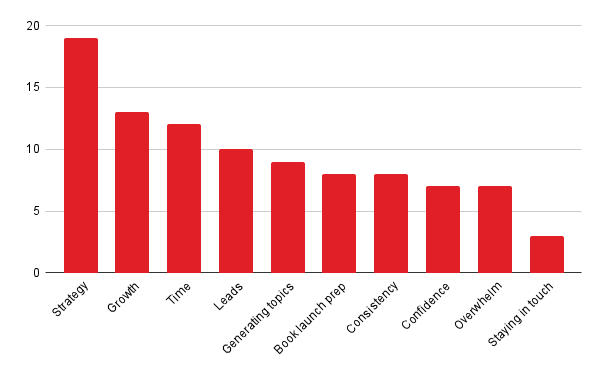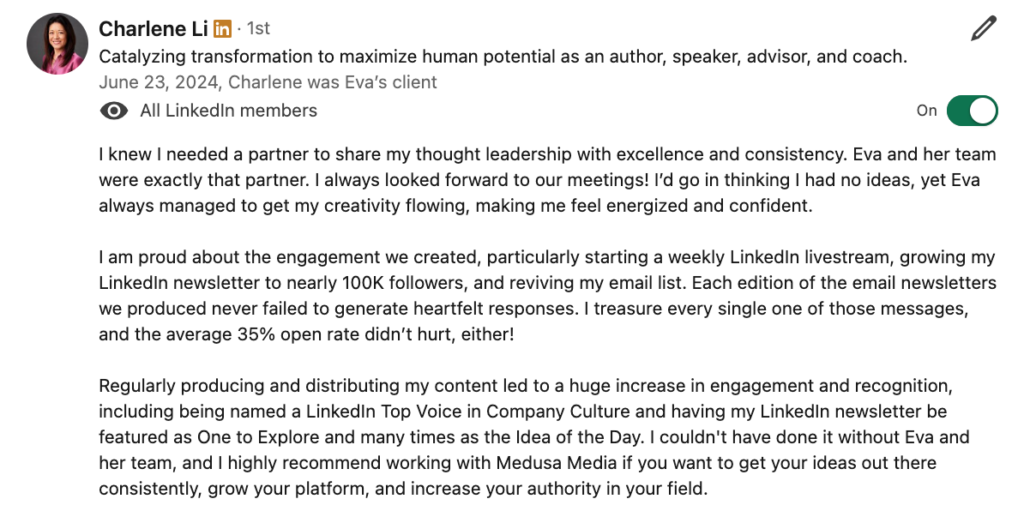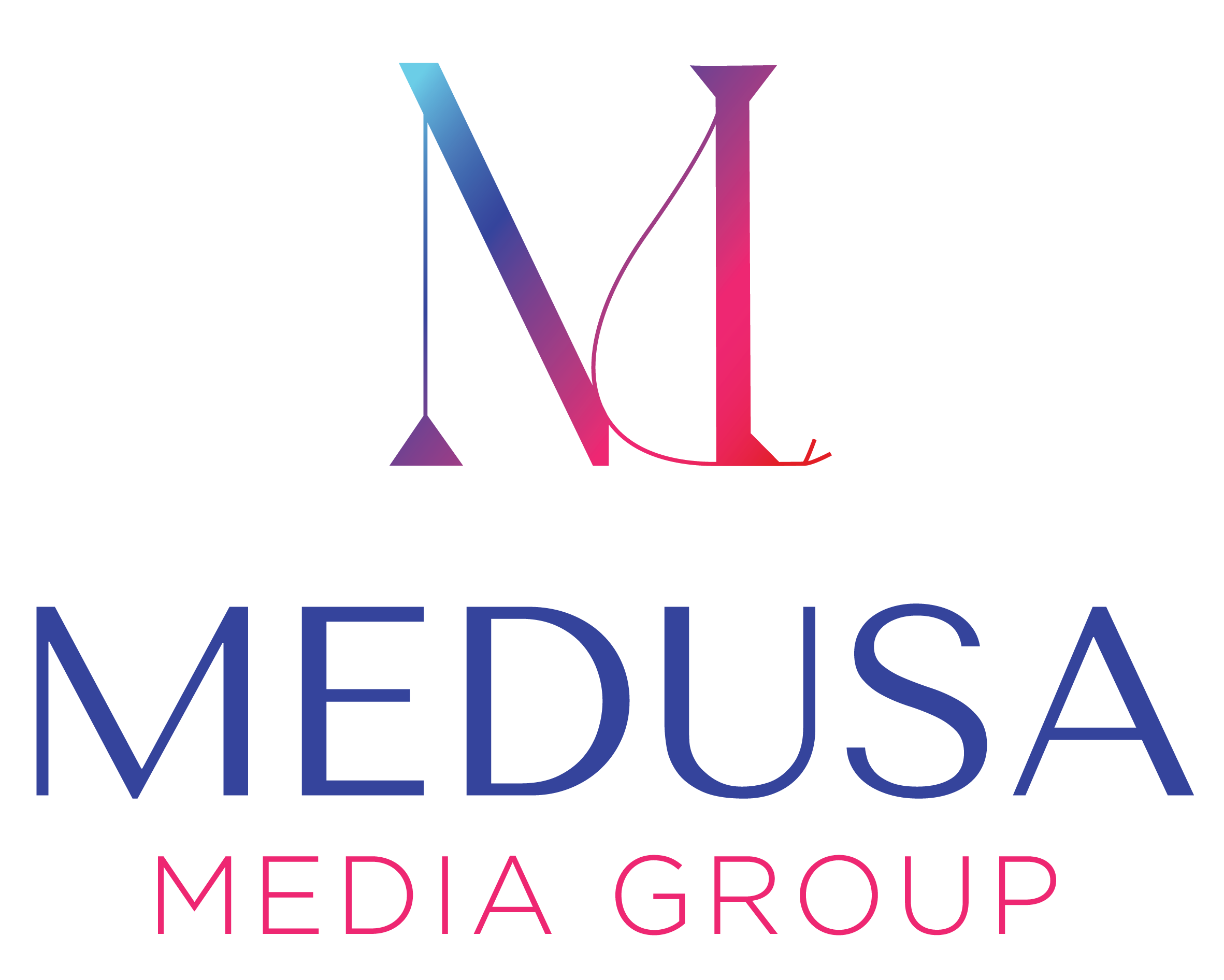If I asked you, “what’s the point of an expert or thought leader marketing herself?
You’d be forgiven for saying, “no need to patronize me. Obviously the point is to make money.”
And you’d be right—sort of. It’s true that nobody’s creating her LinkedIn platform, email list, speaker portfolio, or book proposal for her health. The “point” of growing your audience and authority is to grow your career which is how you make your living. Right?
Right. Sort of.
TL;DR: though many experts are (understandably) reluctant to market themselves, thought leadership marketing is how experts move along the unknown –> known authority spectrum, which leads to more incoming (and well-paying) opportunities and a powerful asset at the negotiating table.
If You’re an Expert, Why Market?
My company helps women and nonbinary experts and thought leaders become household names through content, LinkedIn and email marketing. Yet experts rarely cite “make more money” as their primary reason for seeking out Medusa Media’s services. It’s usually a reason—often in the form of “earn higher speaking fees” or “receive more inbound inquiries” or “negotiate a bigger advance on my next book”—but not the first reason.
And many of these same folks have mixed feelings about marketing. They sense they should be marketing but are dragging their feet (even though not marketing leaves money and impact on the table).
So what’s going on? Why are some experts and thought leaders reluctant to market themselves? When they do invest in marketing their thought leadership, what do they want to get from it? Is thought leadership marketing different from other types? Let’s get into it:
TABLE OF CONTENTS
Click on any of the links below to go directly to the sections that interest you:
- Why experts and thought leaders resist marketing
- What experts want from marketing
- Bar graph: challenges experts face in their marketing
- You might be ready for thought leadership marketing if…
Before we go on, let me be clear: when I talk about thought leadership marketing, I mean a type of content promotion and distribution that focuses on providing insights and a strong position in your unique voice and making an intellectual and emotional impact to position you as an authority so you can build power and wealth and drive social change. This can look like sparking and participating in relevant conversations, connecting with leaders in your field, and sharing research and insights and stories as a few examples.
Let me be clear again: sometimes I use “she/her” pronouns in this piece because after centuries of “he/him” being the default pronouns used to describe people, it’s valuable to use language that depicts women when talking about expertise. That said, the whole gender spectrum is welcome here.
Why Experts Resist Marketing
Online marketing has an “ick” sheen that’s hard to polish off. Think:
- mass growth promises (“how I scaled to six figures in sixty minutes”),
- platitudes and non sequiturs (“I just ate a salad. Here’s what it taught me about thought leadership”), and, a personal least-favorite,
- prosperity gospel nonsense (“all you need to have an Instagrammable life is to change your money mindset/imposter syndrome/blah blah blah by joining my program”) 🙄
NO THANKS!
So you’d be forgiven (again) for thinking of marketing as self-serving, deliberately misleading, even inherently desperate or tacky or predatory—because sometimes it IS. Here’s how one woman put it:
“Us academics ‘tend’ to be a bit snobby about [marketing]. Maybe because of anti-capitalist sentiments in our liberal arts educations? Maybe because we can’t see beyond our own cushy salaried jobs? Maybe because we resist the idea of education as a ‘business’?” – Jenn Wicks
But whatever your sentiments about and experience with marketing (I frequently hear from clients about past social media marketers who disappointed them) hear me out:
Writing off marketing entirely is a disservice to experts and to marketing.
Fundamentally marketing is about spreading the word, spreading knowledge, and raising awareness. Marketing is the function that takes something from unknown to known whether that’s a product, service, cause, politician, person, or public good.
If you’re an expert or thought leader, you are somewhere on the unknown –> known authority spectrum. Say you’re a professor, author, researcher, writer, keynote speaker, consultant, or combination thereof. If you sell your knowledge in the form of consulting, speaking, books, or education, it follows that you could do that MORE if you were better known, right?
It’s a virtuous cycle: the more of a known authority you are, the more opportunities come to you and/or the more prestigious opportunities you qualify for, the more you take those opportunities, the more known you are, and on and on.
Marketing your expertise—by distributing your work and thinking, making it clear what you do and how to hire you, building an intentional community, showing your skills and impact—accelerates the virtuous cycle, leading to more incoming (and well-paying) speaking gigs, sought-after leads, media opportunities, book deals, and more.
This is why obscurity is the enemy of women and nonbinary experts and thought leaders.
What Do Experts and Thought Leaders Want from Marketing?
I will not bury the lede: these are the challenges experts most frequently say they are facing when it comes to their thought leadership and marketing:
Some clients who come to us are excited and ready to market their expertise with more vim and vigor (and help from us)! But it’s common for clients to be some combination of reluctant, curious, and uncomfortable—and that’s totally normal and welcome, too.
When prospective experts and thought leaders reach out, the first thing we ask is for them to fill out this brief inquiry form, which gives us helpful info to guide a discovery call. One question is about the “greatest challenges you’re facing with your thought leadership”—in other words, where are you on the unknown –> known authority spectrum? What’s blocking your virtuous marketing cycle from working the way you want it to?
The answers to this question illuminate what experts and thought leaders ACTUALLY WANT, in their own words, from their thought leadership marketing. After this graph (and if you skipped the table of contents above to read this), I’ll unpack the most common answers, plus one not reflected on the graph but which comes up in client conversations (hint: it’s embarrassment):
Challenges experts face in their thought leadership marketing [Bar Graph]

1. “Creating a distribution [marketing] strategy”
Raise your hand if you (like me) have searched “difference between strategy and tactics” more than zero times 🙋♀️. The words get used interchangeably but they are not the same: a strategy is an overall plan, and the tactics are the individual action steps in the plan.
Unsurprisingly, most experts and thought leaders need both when it comes to marketing their work and it’s the #1 cited reason clients want to work with us. That’s because a strategy answer that critical question: “What the heck should I do and say?” and its many sub-questions: “How should I say/do it? Where should I say/do it? How often? Who am I trying to connect with? In what ways? And importantly, why am I doing this? What do I want?”
Experts and thought leaders have a lot of valuable ideas to share but usually lack the systems that make sharing them (consistently and without it taking a bajillion hours) simple and effective. Besides, you didn’t become an expert because you love marketing or social media, so it’s understandable if you feel self-conscious and overwhelmed by online marketing strategy and technology. This is what prospective clients say to us when sharing their thought leadership challenges:
“Time and strategy for getting content out there, and building a following/mailing list. I’m also working on a book and trying to build interest and a following in a specific and slightly different topic.”
“Creating a strategy and tactics for engaging on LinkedIn around my upcoming book launch.”
“Too many ideas and obstacles executing (perfectionism, time, etc.); not sure what content is most strategic / best ROI”
Working with me and the Medusa Media Group team is one way to address these challenges.
2. “Growing my [LinkedIn] platform”
Clients want growth: of their audience (on LinkedIn in particular), of inbound inquiries, of engagement, email subscribers, and more. Why? For lots of reasons, but primarily to:
- reach more people and make more positive impact with their work
- enhance their brand and reputation (audience numbers are not everything, but you can’t tell me we don’t all judge books by their covers)
- become better-known authority figures, which leads to more opportunities.
If you’ll allow me to repeat myself:
The more known you are, the more opportunities come to you and/or the more prestigious opportunities you qualify for, the more you take those opportunities, the more known you are, and on and on. When you proactively grow your audience on LinkedIn and on your email list, you are cultivating a community of people in a relationship with you. That means more folks who will want to buy your book, recommend or hire you to speak and consult, enroll in your course, etc.
As for “why LinkedIn” it’s because it’s really the only professionally-focused social media and networking platform available. Our clients are usually highly-educated and experienced individuals who sell professional services—they sell B2B or B2(professional)C. If you’re an expert and you’re going to market anywhere on social media, LinkedIn makes the most sense for your expertise and audience.
PSST! If LinkedIn growth is a priority for you, might I recommend my Stop the Scroll: LinkedIn Content Plan for Experts workshop?
3. “Making time”
Remember that meme which read, “Beyoncé only has 24 hours in a day”? I found it inspiring at first (“Beyoncé exists in the same space-time continuum I do!”) until I realized it’s a lie: when you have the resources to hire teams to manage your work and life, you have way more than 24 hours to get things done.
The more their careers grow, the more experts and thought leaders need help. Experts are busy! They might be managing an academic or contract career, preparing for and traveling to keynotes and workshops, writing articles and books, managing a team, conducting research, and that’s just the professional side.
They recognize the importance of marketing themselves to keep the virtuous cycle moving, but marketing is its own function and skillset. It doesn’t make business sense for them to DIY it, nor to ignore it (because it holds back their growth and impact and can be embarrassing).
It does make business sense to hire someone with a proven track record of marketing thought leadership for experts (you can see our track record here). It saves you time and anguish because it’s more efficient and effective. I call it “worry transfer”—you no longer have to worry about staying in touch with your audience or sharing that podcast episode or promoting your book—that’s our job.
4. “I want more leads”
What does it take for someone to become a “lead,” i.e. a person who has shown interest in hiring your services? They have to know, understand, and trust both you as an individual, and the services you offer. Y’know what helps with this? You guessed it! Thought leadership marketing.
Having an active and engaged LinkedIn helps generate leads. Having an active and engaged email list nurtures those leads. Creating unique, accessible and memorable content helps you do both. Marketing maintains your connection with your audience so that when they are ready to hire a speaker or coach or enroll in a program or recommend a book to their bookclub, you are the obvious choice.
(There are also a gazillion additional ways to generate leads. My business coach recommended having three: social media might be one, public speaking might be another, hosting or guesting on podcasts might be a third.)
5. “Generating thought leadership topics”
“My biggest challenges are content ideas and consistent execution.” And, “I have lots of thoughts but not sure if they would fall into the thought leadership category.” And, “I’m struggling and anxious about taking my many ideas and operationalizing them CONSISTENTLY.”
Sound familiar? This challenge is two-fold:
- “Hydra-condition” is the state of having so many ideas, and seeing all the connections between them, that you get frozen with indecision. Having a thought partner (such as yours truly) helps bring focus and clarity to your ideas so they serve you and your audience.
- “You can’t read the label from inside the bottle.” Experts are so close to their work that aspects of it seem obvious or boring or irrelevant. It helps to have a thought partner (me again) to help the expert see those aspects with new eyes and to tie them to what’s going on in the zeitgeist.
This became a running joke when author, speaker, advisor and coach Charlene Li was a client: during every call as we generated ideas for her LinkedIn livestream and email list she’d say, “when we started I was sure I had nothing to say!” In her testimonial she put it this way:
“I knew I needed a partner to share my thought leadership with excellence and consistency. Eva and her team were exactly that partner. I always looked forward to our meetings! I’d go in thinking I had no ideas, yet Eva always managed to get my creativity flowing, making me feel energized and confident.”

6. “I have a book launch coming—I want to be prepared”
Book launches are career catalysts, paving the way to greater authority in the marketplace, higher speaking fees, more inbound inquiries, media appearances and more. If you want to capitalize on such a pinnacle achievement it’s wise to build, in advance, the backend infrastructure that makes it easy to grow your audience and platform online. Furthermore, a strong LinkedIn presence, engaged email list, and warm network are assets at the negotiating table.
We work with many authors, but the same logic applies to other big opportunities: TEDx Talks, launching a podcast, doing a pivot or rebrand. These momentous achievements are an excellent time to tap your network for support (people love supporting others, especially when you make it easy for them) and you’ll only improve the virtuous cycle if you have marketing infrastructure and support in place to leverage the big opportunity.
7. [Bonus] “I don’t want to embarrass myself”
Have you ever had one of those dreams where you suddenly realize you’re inappropriately dressed (or maybe not dressed at all)? The cringe is visceral, and feeling that cringe about your neglected LinkedIn or email list or blog is common. We often work with experts who, thanks to their research or a high-profile achievement, start to see a disconnect between the caliber of their work and the way they come across online.
This challenge usually comes up in conversation, not in our inquiry form. That makes sense, doesn’t it? Feeling embarrassed about your online presence may not be something you’re keen to admit to a thought leader marketing advisor whom you barely know.
I’d love to say, “who cares? Your work speaks for itself!” That’s true to a degree, but if you’ll allow me to repeat myself again, everybody judges books by their covers. For better or worse, your “cover” is your online presence. Imagine someone gets two referrals to keynote their conference: one speaker has an active and engaged LinkedIn presence and the other hasn’t posted in 6 months. Why wouldn’t the conference organizer choose the speaker who can bring those assets to the table?
You might be ready for thought leadership marketing…
If the state of your LinkedIn makes you want to hide behind a tree.
If you have a book being published or you’re growing your speaker portfolio.
If you have plenty to say but no strategy to say it sustainably and effectively.
If you have a wealth of expert content gathering dust on your website or hard drive.
If you want to grow your audience and network and engage in more meaningful conversations.
Those are strong signs that it might be time to market your expertise and thought leadership more intentionally. And I promise: doing so doesn’t have to mean talking about yourself constantly, adding a pile of work to your plate, or sharing anything that will give you a vulnerability hangover.
It also doesn’t have to mean recreating any wheels (many of our clients have a ton of material that can be repurposed for marketing) or doing anything that compromises your values or annoys the people in your community.
Marketing is fundamentally about spreading the word, spreading knowledge, and raising awareness—of you and your work, yes, but of others in your field, of opportunities that abound, of ideas and creative approaches and resources. It can be a tremendous force for doing good—and isn’t that what we’re all doing here?
To learn more about working with me, head to our trusty inquiry form or peep our capabilities deck 👀.







